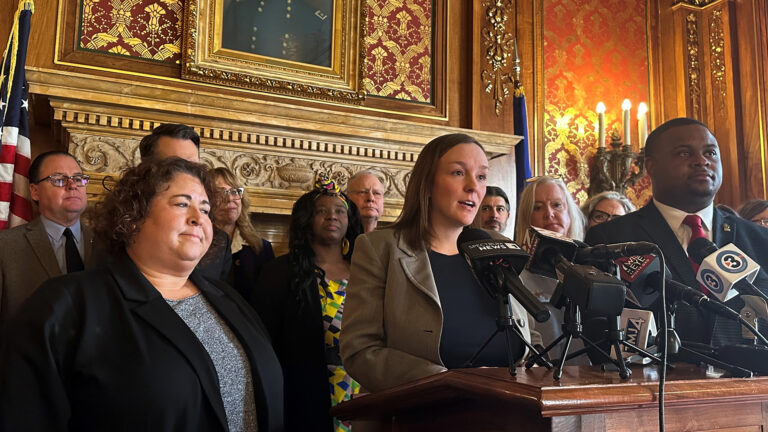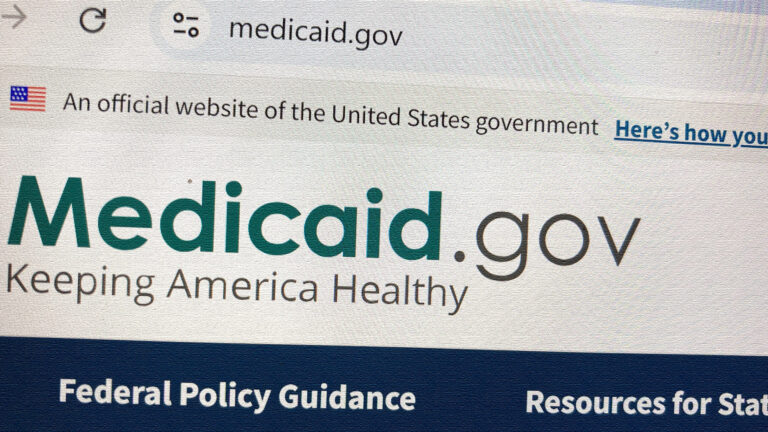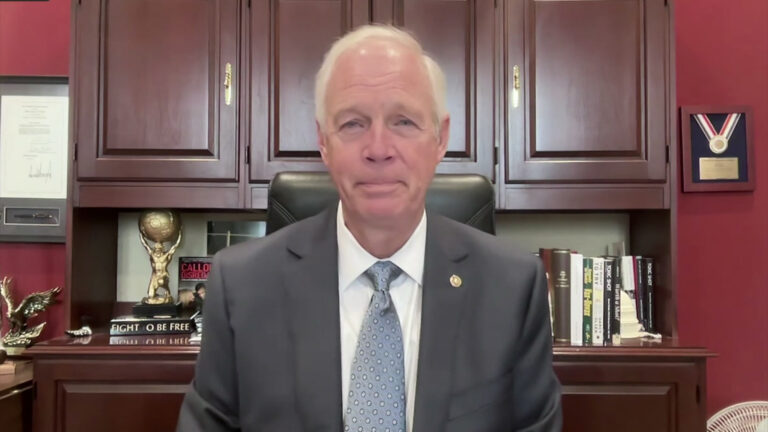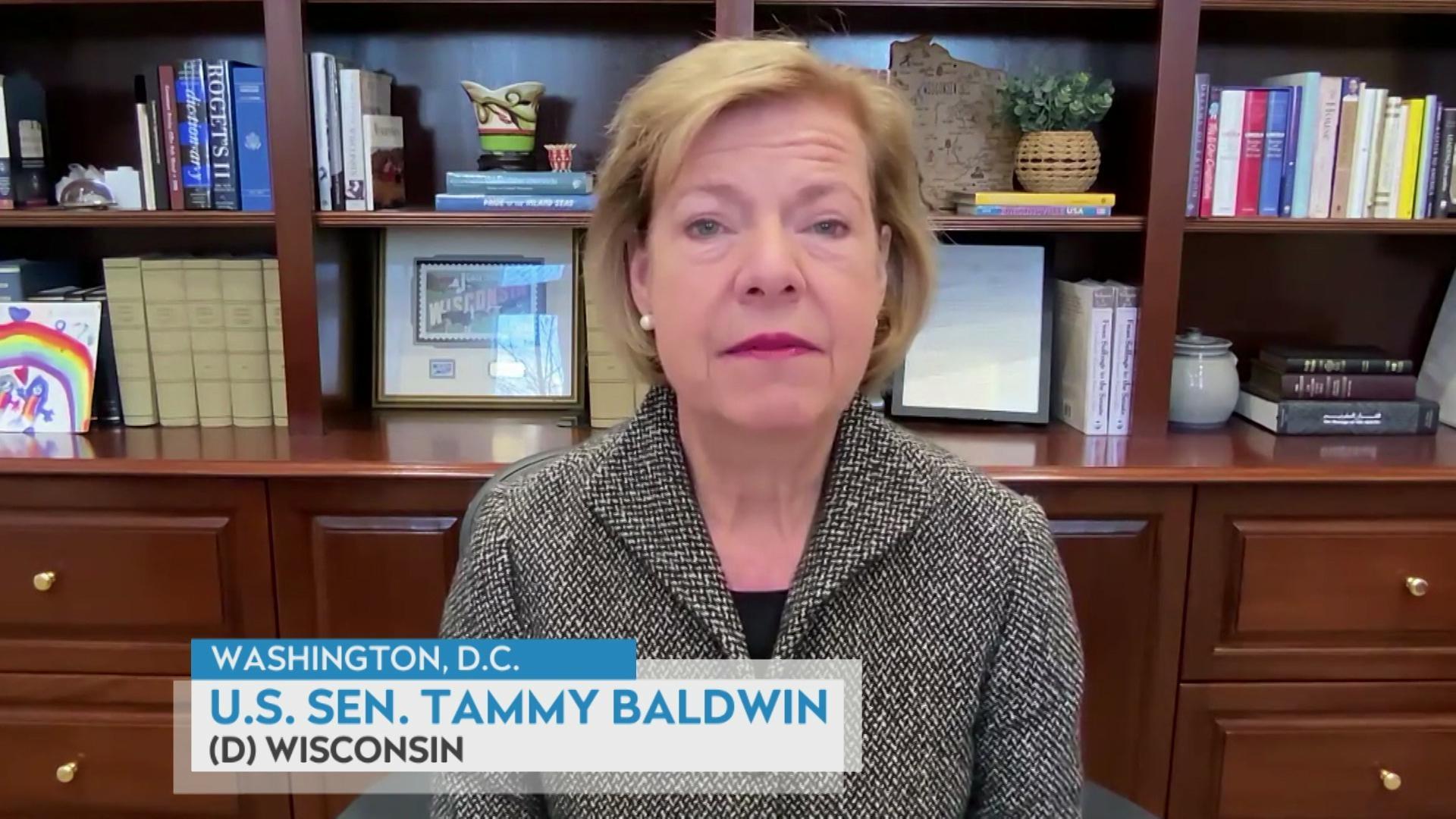Dr. Christopher Ford on pregnancy and serious conditions
By Marisa Wojcik | Here & Now
July 29, 2022
Milwaukee-based emergency physician Dr. Christopher Ford describes efforts to prepare for treating more pregnant patients with critical health issues given less access to medically safe abortions.
VIDEO TRANSCRIPT
Marisa Wojcik:
Thank you so much for doing this.
Dr. Christopher Ford:
Yeah. Thank you. Thanks for having me today.
Marisa Wojcik:
How has the decision to limit access to legal abortion impacted emergency physicians?
Dr. Christopher Ford:
So not only emergency physicians but I feel like healthcare in general, this will be a decision that will have repercussions for primary care doctors, as well as emergency medicine physicians and obstetrics and gynecologists as well but specifically to our specialty emergency medicine what we are bracing for more so is an influx of patients who will unfortunately have adverse repercussions based on the limitation and access to medically safe abortions.
Marisa Wojcik:
And when someone first comes to the ER and whether they know it or not, they're pregnant what are some of the serious conditions that you encounter?
Dr. Christopher Ford:
So what we typically will see regularly are complications related to bleeding, infection, number of different conditions that can affect women and pregnant patients in a host of ways. We essentially are trained as emergency medicine providers to plan for the worst possible outcome in patients that we see. And in that respect for women who are pregnant who are having complications as such, it can be devastating and even can be deadly to patients as well. And so these are things that we consider whenever we see someone who is pregnant, who is coming in with belly pain or coming in with a fever and pregnant and things that we'll need to continue to consider and also to have additional considerations in the setting of the new law change.
Marisa Wojcik:
Can you give some examples?
Dr. Christopher Ford:
So one of the conditions that we see, not commonly but we will see in the emergency department every now and then as a condition called a ruptured ectopic pregnancy. Now this is a condition in which the pregnancy will not be in the uterus where we would normally see a viable pregnancy, but rather in the outside area of the uterus or the adnexa. So what we will typically do in those cases is we'll do an ultrasound to confirm the location of the pregnancy. We'll do a whole battery of test just to make sure that the blood count looks okay and make sure that the pregnancy markers are exactly where we expect them to be. However, one of the complications of an ectopic pregnancy as we see commonly is bleeding. Now, one of the considerations for ectopic pregnancy are one of the things that you must understand is that these pregnancies are not viable. Right now in medicine we do not have the technology or the capabilities of receding that pregnancy in the uterus. And so regularly during our typical standard of care these are patients that would go to the operating room with our partners from the gynecology divisions to have essentially an abortion of that pregnancy in order to save the life of the mother. And so that's something that we want to continue to happen because again, these are lifesaving therapies but also for people to be aware who are providers that this is still something that we are obligated to perform.
Marisa Wojcik:
And is that something that is standard, do you think for emergency room physicians across the state?
Dr. Christopher Ford:
Absolutely, so I have been very fortunate to practice at different settings throughout the state of Wisconsin. I currently practice in a setting in which I am in the metropolitan areas mostly. However, I've been in rural locations where I've been the only doc on call in the middle of the night for the next 20 miles or so. And so my patient demographic is going to be similar to patient demographics if I'm in one of the city facilities that I have ample resources available to me at all hours of the night. And so what my concern is at this point in time is what is going to happen to the rural doc when she is working at two o'clock in the morning and you have this ruptured ectopic pregnancy that comes in. What we don't want to happen is we don't want that physician to be on the phone with a lawyer to try to determine what is right and what is wrong, what could the potential repercussions be both legally and professionally, if she does what she knows is right for the patient and what can be life saving for the patient
Marisa Wojcik:
Has that happened?
Dr. Christopher Ford:
So I have read multiple reports at this point in time by both ER docs, as well as gynecologists already in the state and some outside the state as well who have been on the phone with lawyers for a number of hours in order to, again, try to negotiate what is going to be the best way to care for these patients. And again, what ramifications could be felt by that provider should they go ahead with a therapy that they did just months ago and what is the typical standard of care for these patients? So it's definitely a situation now that has become very scary to be a provider and is also a detriment to the patients that we're treating.
Marisa Wojcik:
And that's for an ectopic pregnancy which is considered to be more obvious, I guess, but there are a number of other conditions that are much less clear for physicians. Is there any sort of guidance that people can go to that they can make a quick decision?
Dr. Christopher Ford:
So as of right now, there have been a couple of governing bodies both in obstetrics, as well as in emergency medicine and even at the state level, in which we have guidelines to help support our clinical decision making. One of the policy statements was performed by the Centers of Medicare and Medicaid that was most recently updated in late 2021 in which they leaned on the fact that we are covered as providers, both in the emergency setting, as well as in the obstetrical setting to do the best thing for our patients in the moment in order to prevent any morbidity or mortality as we call it or any risk for death or bad outcomes. At this point in time, the most recent policy statement by our governing body and emergency medicine is to reflect on that recommendation and to know that as a provider, you're covered both on a on a federal level, as well as a professional level in order to protect the life of your patient at the time.
Marisa Wojcik:
And yet we're still hearing stories of mothers that are infected or bleeding for many days. Are you concerned as an ER physician that will keep hearing a lot of these stories?
Dr. Christopher Ford:
Absolutely, so at this point in time there was a recent podcast that came out. We have a continuing medical education podcast that's called emergency medicine reviews and perspectives. And they did a piece right around the time that this decision came out. And what they reflected on was the two different categories of abortions that we see on a global standpoint. And it was based on the World Health Organization's definitions of such. One is considered a safe abortion. So of course if you think about it, it's an abortion that's performed in a medical setting, hopefully, by practitioners that are well educated on the complications and have done the research on different methods to perform the procedure. Now, unsafe abortions are kind of the opposite of that, right? And so these are procedures that are performed by people who aren't traditionally trained by methods that aren't up to the standard of care that we're normally seen in a developed nation in which this is legal. Now, what we have seen on a global perspective is when there are strict restrictions against abortions in a safe manner, it doesn't stop the practice. And so what we worry about in emergency medicine, and of course, we're about a month out from the decision, but what we worry about at this point in time is are we going to start to see that number creep up for women that are seeking care from people who aren't licensed professionals and may have bad outcomes related to an unsafe abortion. Now, with that being said, we see a stark difference in the complications from safe abortions versus unsafe. So if you think about complications in the form of bleeding, infections, these are less than 1% morbidity mortality. Death is less than 1% in safe abortions. However, if you look at the unsafe abortions we're seeing numbers up to 4.5 to 13% for mortality alone. About a third of those patients will have adverse outcomes or have some complication. And so this is something that not only are we planning for and kind of keeps us awake at night but it's something that we have to continue to expect in our emergency departments coming soon.
Marisa Wojcik:
Along those lines, are you at all concerned that the medications used to induce abortions will become more limited or even banned out of more policies put in place?
Dr. Christopher Ford:
And so it's tough to determine what will come down the pike for our patients who are seeking treatments in this fashion. One of the things that the Centers of Medicare, and Medicaid really touch on, as well as in that EMTALA article of reference, it's more so the different techniques and the different modalities of abortion. And so definitely included in that are medications like misoprostol that are used typically to induce medicinal abortions. And so with the way the abolition of the law is structured now that technically is covered under what has been removed from the treatment modalities.
Marisa Wojcik:
And those are frequently used for miscarriages
Dr. Christopher Ford:
Exactly, for miscarriages as well as for intended abortions as well.
Marisa Wojcik:
And have you seen or heard of any complications with miscarriages since the decision came down?
Dr. Christopher Ford:
So that is essentially the situation in where we have people who have been on the phones for a number of hours now, in order to try to determine if they can give that medication. What would be the liability based on that? We've had a couple of articles that have been written recently about people who have been seeking unsafe abortions as well. And what are the ramifications of transferring that patient to a facility in which they can safely perform a lifesaving procedure and in a state much like our own, where that may not be legal. And so fortunately we have clear guidelines from a federal standpoint. However, the statewide standpoint is a little bit more of a gray area.
Marisa Wojcik:
How does that make you feel as a physician because your job is to do everything you can for your patient?
Dr. Christopher Ford:
Anyone in medicine, the primary purpose of medicine is to do no harm. We've all trained very long time and have put forth a lot of effort to do what's best for our patients. And it gets frustrating at times when you attempt to do that and what the next step is and you can't do it because of certain parameters in place. However, that won't stop us from doing what we need to do in the moment. And I hope that a lot of other physicians in the state share that same model, essentially. We need to continue to protect our patients and continue to do what's safe for them.
Marisa Wojcik:
Are patients of childbearing years expressing fears and concerns.
Dr. Christopher Ford:
Absolutely, I've had a number of patients who have come in who either got the pregnancy diagnosis here in the emergency department when I saw them versus if they got a home test and had a positive test and in sort of counseling them for next steps if they wish to seek an abortion they're devastated because they know the recent changes in laws. And so for those patients, it's a very scary moment. For us it's a scary moment because we as providers don't know what the next steps are for that patient, at least if they remain in the state.
Marisa Wojcik:
And there are patients who do want children and the fear is still if complications happen.
Dr. Christopher Ford:
Yeah, absolutely. And so that the other side of the coin. And so if there are complications associated with it, if let's say this is an unviable pregnancy for whatever reason, will there be potential damage or even death associated with adverse outcomes, if we aren't able to perform a medically indicated procedure. And so for that demographic as well on a whole, for our patients, it can be something that is very very unsettling.
Marisa Wojcik:
If you had a crystal ball and kind of thought about what was going to happen next, what do you think would be kind of the best outcome?
Dr. Christopher Ford:
So fortunately I am on the medical aspect of things and I never want to perceive the future or think about what politicians are going to do next this summer part. But what I will say is what I would want for our medical institution in general to do is to continue to plan and ahead for potential adverse events to continue to do what's right for our patients, as well as to continue to fight for our patients, because this as well as other indications that we've been doing since the advent of medicine we're going to continue to do what's right and we're going to continue to fight for those who can't fight for themselves.
Marisa Wojcik:
All right, Dr. Chris Ford, thanks very much.
Dr. Christopher Ford:
Thank you so much.
 Passport
Passport











Follow Us